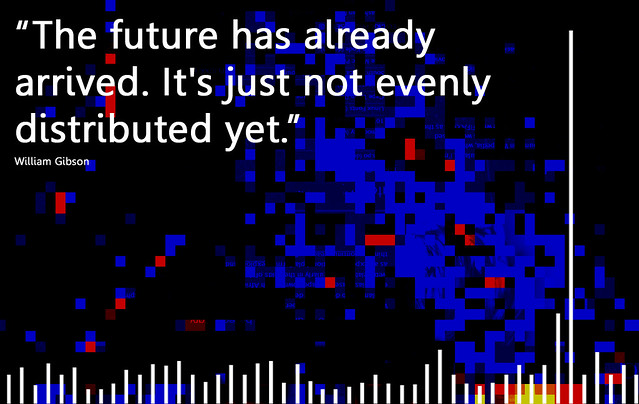I wrote this article for our parents in our school’s monthly magazine a few months ago, and realized I had not yet shared it here.

(Image credit: Will Lion)
No one knows exactly what form the technology of the future will take, although there are those attempting to make predictions. Ray Kurzweil, a futurist, has this to say on the accelerating rate of change of technology:
Now back to the future: it’s widely misunderstood. Our forebears expected the future to be pretty much like their present, which had been pretty much like their past. Although exponential trends did exist a thousand years ago, they were at that very early stage where an exponential trend is so flat that it looks like no trend at all. So their lack of expectations was largely fulfilled. Today, in accordance with the common wisdom, everyone expects continuous technological progress and the social repercussions that follow. But the future will be far more surprising than most observers realize: few have truly internalized the implications of the fact that the rate of change itself is accelerating.
We do know that new technologies impact our society in profound ways. Of this issue, Neil Postman, a media theorist, said this of technology change:
Technological change is not additive; it is ecological. I can explain this best by an analogy. What happens if we place a drop of red dye into a beaker of clear water? Do we have clear water plus a spot of red dye? Obviously not. We have a new coloration to every molecule of water. That is what I mean by ecological change. A new medium does not add something; it changes everything. In the year 1500, after the printing press was invented, you did not have old Europe plus the printing press. You had a different Europe. After television, America was not America plus television. Television gave a new coloration to every political campaign, to every home, to every school, to every church, to every industry, and so on.
The introduction of the car influenced both how and where we live, and the environments we live in. The television radically transformed how information and culture are transmitted in our society. Airplanes changed where we travel, and how far away from our extended families we are willing to live. The Internet is in the midst of transforming every aspect of our society, from how we shop, to how we learn new things, to how we work. These disruptive technologies could not have been predicted 120 years ago, and we are still feeling the ripples of the changes these technologies have wrought on our society.
If we know that an unknown change is going to greatly influence our students’ lives, how do we prepare them for it?
The first key to preparing for an uncertain future is adaptability. One has to be willing to explore new technologies and see how those technologies influence us. This is one of the strengths of our ‘bring your own computer’ program. Students see that we accept a wide variety of different computers, and can often be seen exploring and sharing each others’ technology. In this way, they learn that computers are not about one model, or one brand, but instead about the functionality of the computer.
The second key to preparing is critical thinking. This is part of the purpose of the IB education our students experience. They learn to question everything. They learn not to accept ‘facts’ at face value, and to recognize that people use facts to represent their perspective on an issue. The same thing is true of technology change. Most people see technology as this magical thing that influences and improves our lives; our students will hopefully see technology as a thing to be examined and critiqued. The critiques students learn how to do in their IB History class will help them critique their own use of technology. They will hopefully be able to ask two important questions of each new technology they encounter: what abilities does this technology give us, and what does it take away?
A third key to preparing for the future is balance. We are not a technology school, we are a school that uses technology. Our students learn a wide variety of different tools, but they also learn, through our Outdoor Experiential Education and our Creativity, Action, Service programs, about the balance necessary to have a successful life. Our hope is that students will be able to apply this understanding of balance to all aspects of their lives, including their use of technology.
Our students face an uncertain future as our society adapts to as yet unknown technologies. They may see the introduction of flying cars, microscopic computers, artificial intelligence, and other technologies that we cannot even imagine. They will likely experience more radical changes in our society than all of the most disruptive technologies from the past century have managed to do. Our hope is that the education they experience at Stratford Hall helps prepare them for these changes.